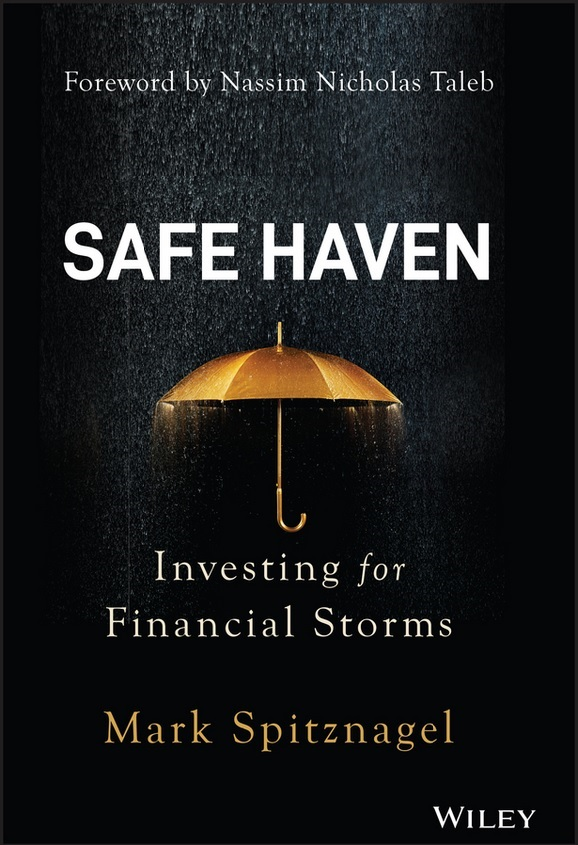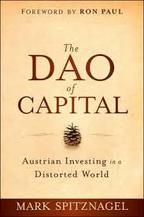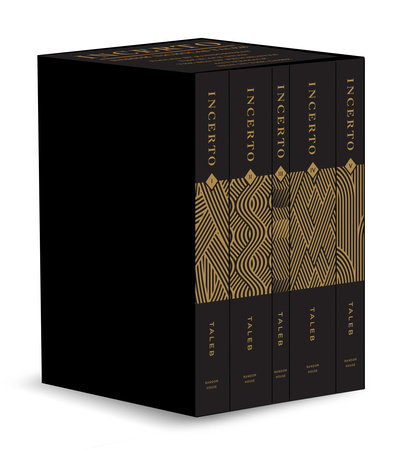|
"As introduced (and formulated) in Safe Haven, risk mitigation needs to be ‘cost-effective’ (i.e., it should raise your wealth), and to do that it needs to mitigate the risks that matter, not the risks that don’t." --Nassim Nicholas Taleb "Clear, logical and persuasive, Safe Haven is highly recommended for all students of the markets—novice and professional. Spitznagel masterfully builds from first principles, establishing the role risk mitigation ought to play in investment portfolios and provides a simple yet practical framework to identify and analyze said Safe Havens." --Harshal Chaudhari, Chief Investment Officer - General Electric Pensions "Properly priced insurance against big investment losses can increase the expected compound growth rate of both insurer and insuree. It is a widely overlooked free lunch. Mark Spitznagel, a leading long-term practitioner, shares his insights from analyzing this extremely counterintuitive idea." --Edward O. Thorp, Author of Beat the Dealer and A Man for All Markets "Safe Haven confronts the central challenge for an investor constructing a portfolio for the long term: how to mitigate systemic risk while enhancing the compound growth of the entire portfolio. Mark Spitznagel takes aim at the weaknesses of modern portfolio theory and offers a clear and compelling case for a better alternative framework." --Ted Eliopoulos, Vice Chairman, Morgan Stanley Investment Management, ex-CIO of CalPERS |
What is a safe haven?
What role should they play in an investment portfolio? Do we use them only to seek shelter until the passing of financial storms? Or are they something more? Contrary to everything we know from modern financial theory, can higher returns actually come as a result of lowering risk? In Safe Haven, hedge fund manager Mark Spitznagel—one of the top practitioners of safe haven investing and portfolio risk mitigation in the world—answers these questions and more. Investors who heed the message in this book will never look at risk mitigation the same way again.
What role should they play in an investment portfolio? Do we use them only to seek shelter until the passing of financial storms? Or are they something more? Contrary to everything we know from modern financial theory, can higher returns actually come as a result of lowering risk? In Safe Haven, hedge fund manager Mark Spitznagel—one of the top practitioners of safe haven investing and portfolio risk mitigation in the world—answers these questions and more. Investors who heed the message in this book will never look at risk mitigation the same way again.
|
"Spitznagel has written an essential new book. Indeed, The Dao of Capital: Austrian Investing in a Distorted World might be one of the most important books of the year, or any year for that matter." --Forbes “At last, a real book by a real risk-taking practitioner. You cannot afford not to read this!” --Nassim Nicholas Taleb “Investors of all kinds will find immeasurable value in this convincing and thoroughly researched book where Mark champions the roundabout.” --Paul Tudor Jones II |
As today's preeminent doomsday investor Mark Spitznagel describes his Daoist and roundabout investment approach, “one gains by losing and loses by gaining.” This is Austrian Investing, an archetypal, counterintuitive, and proven approach, gleaned from the 150-year-old Austrian School of economics, that is both timeless and exceedingly timely.
In The Dao of Capital, hedge fund manager and tail-hedging pioneer Mark Spitznagel—with one of the top returns on capital of the financial crisis, as well as over a career—takes us on a gripping, circuitous journey from the Chicago trading pits, over the coniferous boreal forests and canonical strategists from Warring States China to Napoleonic Europe to burgeoning industrial America, to the great economic thinkers of late 19th century Austria. We arrive at his central investment methodology of Austrian Investing, where victory comes not from waging the immediate decisive battle, but rather from the roundabout approach of seeking the intermediate positional advantage (what he calls shi), of aiming at the indirect means rather than directly at the ends. The monumental challenge is in seeing time differently, in a whole new intertemporal dimension, one that is so contrary to our wiring.
Spitznagel is the first to condense the theories of Ludwig von Mises and his Austrian School of economics into a cohesive and—as Spitznagel has shown—highly effective investment methodology. From identifying the monetary distortions and non-randomness of stock market routs (Spitznagel's bread and butter) to scorned highly-productive assets, in Ron Paul's words from the foreword, Spitznagel “brings Austrian economics from the ivory tower to the investment portfolio.” The Dao of Capital provides a rare and accessible look through the lens of one of today's great investors to discover a profound harmony with the market process—a harmony that is so essential today.
In The Dao of Capital, hedge fund manager and tail-hedging pioneer Mark Spitznagel—with one of the top returns on capital of the financial crisis, as well as over a career—takes us on a gripping, circuitous journey from the Chicago trading pits, over the coniferous boreal forests and canonical strategists from Warring States China to Napoleonic Europe to burgeoning industrial America, to the great economic thinkers of late 19th century Austria. We arrive at his central investment methodology of Austrian Investing, where victory comes not from waging the immediate decisive battle, but rather from the roundabout approach of seeking the intermediate positional advantage (what he calls shi), of aiming at the indirect means rather than directly at the ends. The monumental challenge is in seeing time differently, in a whole new intertemporal dimension, one that is so contrary to our wiring.
Spitznagel is the first to condense the theories of Ludwig von Mises and his Austrian School of economics into a cohesive and—as Spitznagel has shown—highly effective investment methodology. From identifying the monetary distortions and non-randomness of stock market routs (Spitznagel's bread and butter) to scorned highly-productive assets, in Ron Paul's words from the foreword, Spitznagel “brings Austrian economics from the ivory tower to the investment portfolio.” The Dao of Capital provides a rare and accessible look through the lens of one of today's great investors to discover a profound harmony with the market process—a harmony that is so essential today.
|
“The hottest thinker in the world.”--The Sunday Times (London)
“The most prophetic voice of all . . . a genuinely significant philosopher.”--GQ "Imagine someone with the erudition of Pico de la Mirandola, the skepticism of Montaigne, solid mathematical training, a restless globetrotter, polyglot, enjoyer of fine wines, specialist of financial derivatives, irrepressible reader, and irascible to the point of readily slapping a disciple." La Tribune (Paris) “A bold book explaining how and why we should embrace uncertainty, randomness, and error . . It may just change our lives.”--Newsweek, on Antifragile “[A book] that altered modern thinking.”--The Times (London), on The Black Swan “[Fooled by Randomness] is to conventional Wall Street wisdom approximately what Martin Luther’s ninety-five theses were to the Catholic Church.”—Malcolm Gladwell, The New Yorker |
The landmark five-book investigation of uncertainty, chance, volatility, risk, and decision-making in a world we don’t understand—now in a beautifully designed, cloth-bound deluxe hardcover boxed set.
Nassim Nicholas Taleb’s New York Times bestselling series—consisting of Antifragile, The Black Swan, Fooled by Randomness, The Bed of Procrustes, and Skin in the Game—has changed the way millions see the world and think about uncertainty, chance, volatility, and risk across a wide range of domains. They can be read singly but are also written to complement each other and actually comprise a single work. The Incerto is that collection to offer readers the full scope of the most significant and impactful intellectual projects of our time.
In Fooled by Randomness, Taleb explores the impact of one of the least understood forces in all of our lives—randomness—and its effects in the forum in which luck is most conspicuously mistaken for skill: the world of business.
In The Black Swan, Taleb shows us that highly improbable and unpredictable events underlie almost everything about our world.
The Bed of Procrustes, a provocative book of aphorisms, represents Taleb’s view of modern civilization’s hubristic side effects—modifying humans to satisfy technology and blaming reality for not fitting economic models.
In Antifragile, Taleb identifies a category of things that not only gain from chaos but need it in order to survive and thrive.
Skin in the Game shows how the willingness to accept one’s own risks is an essential attribute of heroes, saints, and flourishing people in all walks of life.
Nassim Nicholas Taleb’s New York Times bestselling series—consisting of Antifragile, The Black Swan, Fooled by Randomness, The Bed of Procrustes, and Skin in the Game—has changed the way millions see the world and think about uncertainty, chance, volatility, and risk across a wide range of domains. They can be read singly but are also written to complement each other and actually comprise a single work. The Incerto is that collection to offer readers the full scope of the most significant and impactful intellectual projects of our time.
In Fooled by Randomness, Taleb explores the impact of one of the least understood forces in all of our lives—randomness—and its effects in the forum in which luck is most conspicuously mistaken for skill: the world of business.
In The Black Swan, Taleb shows us that highly improbable and unpredictable events underlie almost everything about our world.
The Bed of Procrustes, a provocative book of aphorisms, represents Taleb’s view of modern civilization’s hubristic side effects—modifying humans to satisfy technology and blaming reality for not fitting economic models.
In Antifragile, Taleb identifies a category of things that not only gain from chaos but need it in order to survive and thrive.
Skin in the Game shows how the willingness to accept one’s own risks is an essential attribute of heroes, saints, and flourishing people in all walks of life.


